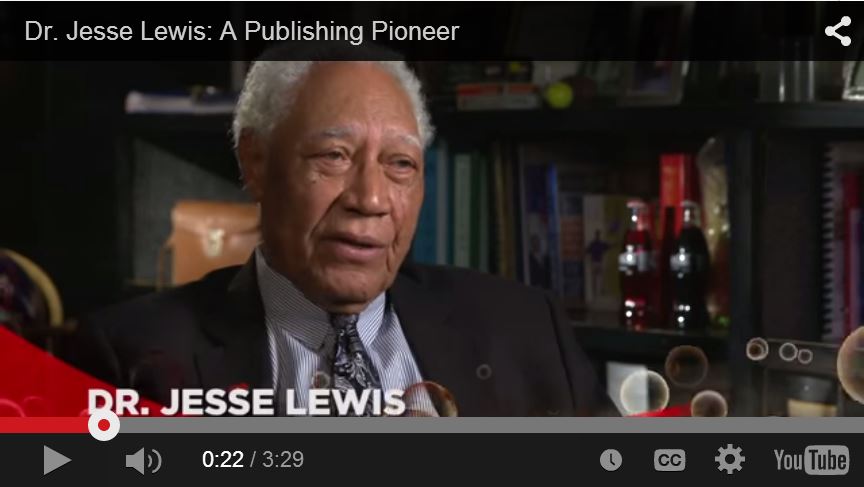He was studying in the Miles College library in Birmingham, Ala. in the early-1950s when he came across an Advertising Age story about a marketing company employing college students to promote various consumer products on campuses.
The piece inspired Lewis to hire students on a dozen or so African-American college campuses to market everything from cigarettes to hair products.
“I came to college with no car and no money, and I left with a bank account and a brand-new car,” Lewis recalls. “I knew nothing about how to merchandise or advertise a product… I just read that article and thought it was something I could do.”
His intuition turned out to be right. In 1954, Lewis founded the country’s first black-owned PR and advertising agency. His firm focused exclusively on the black consumer.
“In order to sell someone something, you have to ask them to buy it,” he explains. “At the time, nobody out there was attempting to sell to black people… so I had a goldmine.”
Lewis quickly picked up a handful of local customers — including the Birmingham Coca-Cola Bottling Company — before going national.
“I convinced them that if they hired me, I’d open doors in the black community where Coca-Cola would be prevalent,” he says. “And that’s what happened.”
A natural salesman and entrepreneur, Lewis challenged himself to sell 10 cases of Coke a week by producing radio commercials and print ads targeting and featuring blacks — from celebrities such as Willie Mays, Sugar Ray Robinson and the Harlem Globetrotters — to Mary Alexander, the first African-American female model to appear in Coke advertising. Lewis scouted, hired and even photographed the talent. When mainstream newspapers refused to publish ads featuring black models, his team printed them on sheets of paper to pass out in stores serving the black community.
Lewis worked with fellow African-American PR pioneer Moss Kendrix and Coca-Cola advertising director Deloney Sledge to build a national network of ambassadors to sell Coca-Cola ads to black newspapers and radio stations.
“My job was to go around the country and get Coca-Cola bottlers to hire minorities,” he explained. “We built an organization of about 35 to 40 people.”
The ideal candidates were college-educated, sales-oriented professionals with connections in the black community. “We had a lot to choose from because blacks were not being hired at the time,” Lewis said. “If I went to a town to interview someone, I could find 300 to 400 people.”
Lewis entered the newspaper business in 1963 during the height of the civil rights movement, founding The Birmingham Times to document and celebrate the city’s African-American community.
At the time, Birmingham’s daily newspapers only mentioned blacks in the crime section. And the city’s other minority papers solely covered racial segregation and discrimination issues. Lewis had a different editorial vision.
“I thought we needed a publication to record the history of black people from a positive standpoint… all their accomplishments and the little things they do,” he said. “This is our 49th year of printing and 50th year in business… that’s how we’ve survived.”
Coca-Cola was there once again to support Lewis’ fledgling enterprise as its first advertiser, backing the paper before its debut issue went to press.
“If it wasn’t for the Birmingham Coca-Cola Bottling Company, I wouldn’t have a nickel or a nail,” he said with a smile. “With everything I’ve ever been involved in, they’ve come to the table immediately and said, ‘We want to help.’”
Dr. Jesse Lewis, 89, is founder and publisher of The Birmingham Times. His marketing firm developed some of the first ads targeting and featuring African-Americans in the 1950s, including several campaigns for Coca-Cola.
Paying it Forward
Throughout his decorated career, the World War II veteran has worn countless professional hats, from serial entrepreneur, to educator, to political consultant. In 1975, he became the first African-American appointed to Alabama Governor George Wallace’s cabinet when he was named director of the state’s highway and traffic safety department.
“I’ve owned or partnered in about 19 different businesses,” Lewis toldThe Tuscaloosa News in November 2013. “I’ve owned every kind of business you can dream of. I never looked backwards, and I learned something from everything I owned.”
Now, at 89 years old — “I drink four Cokes a day… that’s what makes me look young” — Lewis says he has the responsibility to pass on what he’s seen and learned to the next generation.
Through the Coca-Cola Pay it Forward apprenticeship program, he’ll mentor a deserving young person from the Birmingham community in the year ahead.
“I have a motto,” he explained. “Every day, I try to help somebody do something they can’t do for themselves. I’m committed to this program… it’s a great concept, and I’m excited about it.”
Jamal Booker contributed to this story.
